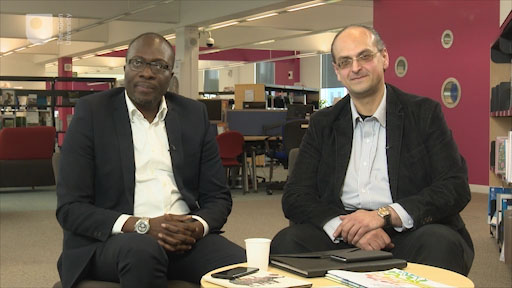Session 1: The nature of Master’s-level study
Introduction
Welcome to the course Succeeding in postgraduate study.
In this first session we will be taking a look at Master’s-level study and how it differs from undergraduate study. We will consider some of the requirements and demands of studying at this level, explore the different types and purpose of Master’s degrees, and look at some of the characteristics expected of Master’s graduates – those who have successfully completed a Master’s degree programme.
Before we begin, please watch this short video in which the course authors, Eric Addae-Kyeremeh and Payam Rezaie, introduce you to Session 1.

Transcript: Session 1 introduction
Please note that the ‘accompanying introductory notes’ mentioned in the video refer to this page in the Introduction and guidance section [Tip: hold Ctrl and click a link to open it in a new tab. (Hide tip)] .
Having viewed the video, you should now have a good impression of what this course sets out to achieve, how this suits your particular study needs, and how it will enable you to be better prepared for postgraduate study. Just to reaffirm, throughout this course when we refer to ‘postgraduate study’, we mean Master’s-level or equivalent study undertaken as part of a taught postgraduate programme (PGCert, PGDip, MSc, MA, MBA), and not ‘research’ degrees (MPhil or PhD) per se. However, the fundamental principles and core study skills that are discussed here do also apply more generally, including to research degree programmes.
Moving on to postgraduate study can seem daunting at first, particularly if you are returning to study after an extended break. We want to reassure you right from the start – you shouldn’t be put off if you find, as you work through the course, that you are not confident in your abilities or understanding in some areas. Our aim throughout this course is not only to help you gain a better understanding of the requirements and demands of studying at Master’s level, but also to provide you with practical advice, and essential tools that will build on your existing capabilities, and support you to develop your skills and the confidence to pursue your learning further. Activities within this session will specifically help you to check your expectations, evaluate your readiness, and develop key skills (such as prioritising tasks, managing your study time, and personal development planning) that will ensure you are both well-informed and well-prepared for postgraduate study. Towards the end of this session, we will also introduce you to some aspects of studying for a Master’s by distance learning, as an option that may suit your personal lifestyle and career goals. We discuss some of the benefits as well as the pressures of studying online, and take a look at certain misconceptions around distance and online learning.
By the end of this session you should be able to:
- understand the requirements and demands of academic study at Master’s level
- understand the nature of distance learning on a Master’s programme
- plan your studies to suit your work−life situation and optimise your study time.
The Open University would really appreciate a few minutes of your time to tell us about yourself and your expectations for the course before you begin, in our optional start-of-course survey. Participation will be completely confidential and we will not pass on your details to others.
